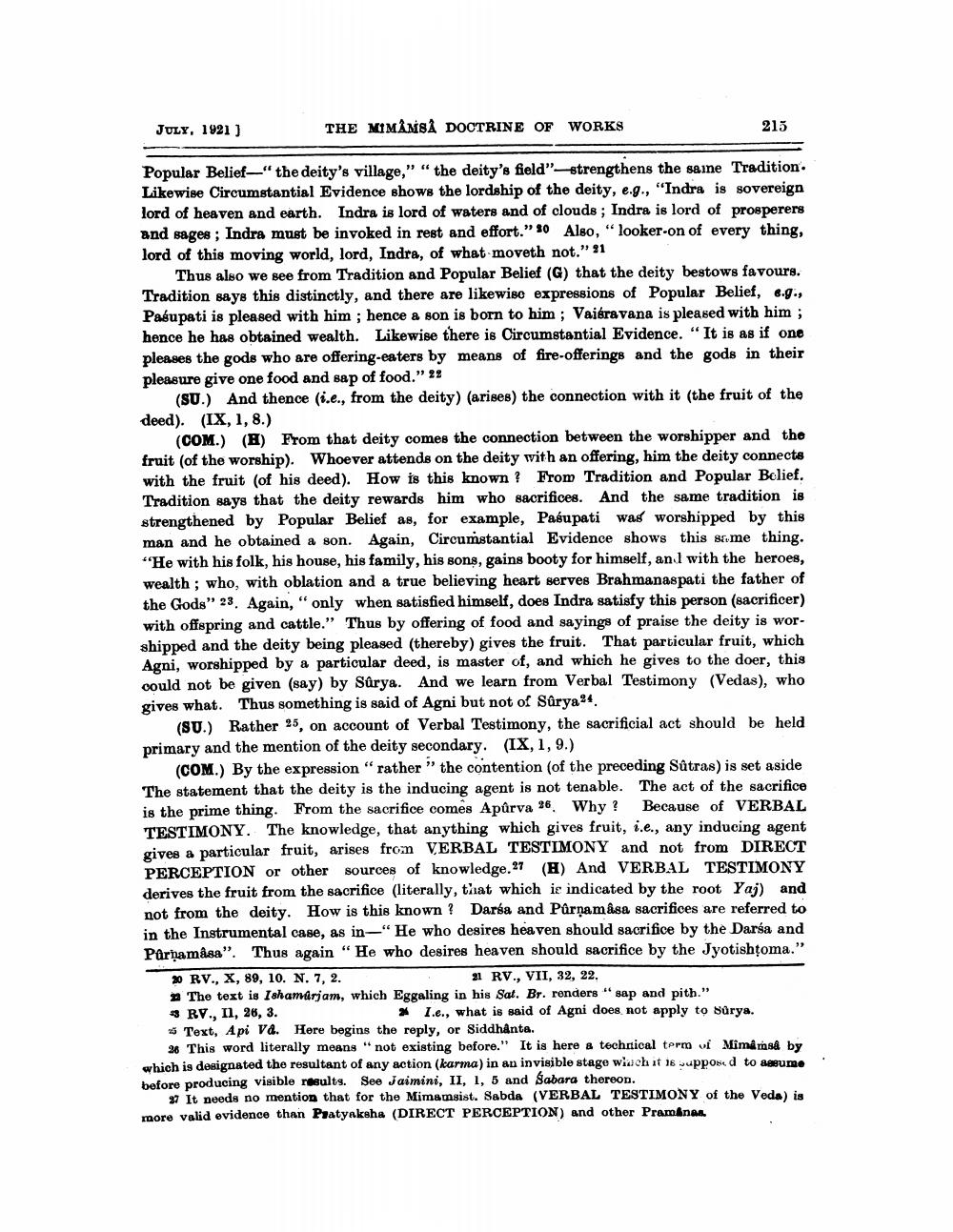________________
JULY, 1921)
THE MIMÂMSÅ DOCTRINE OF WORKS
215
Popular Belief-"the deity's village," "the deity's field"-strengthens the saine Tradition. Likewise Circumstantial Evidence shows the lordship of the deity, e.g., "Indra is sovereign lord of heaven and earth. Indra is lord of waters and of clouds ; Indra is lord of prosperers and sages ; Indra must be invoked in rest and effort." 30 Also, “looker-on of every thing, lord of this moving world, lord, Indra, of what moveth not." 21
Thus also we see from Tradition and Popular Belief (G) that the deity bestows favours. Tradition says this distinctly, and there are likewise expressions of Popular Belief, e.g., Pasupati is pleased with him ; hence a son is born to him ; Vaisravana is pleased with him ; hence he has obtained wealth. Likewise there is Circumstantial Evidence. “It is as if one pleases the gods who are offering-eaters by means of fire-offerings and the gods in their pleasure give one food and sap of food." 22
(SU.) And thence (i.e., from the deity) (arises) the connection with it (the fruit of the deed). (IX, 1, 8.)
(COM.) (H) From that deity comes the connection between the worshipper and the fruit (of the worship). Whoever attends on the deity with an offering, him the deity connects with the fruit (of his deed). How is this known ? From Tradition and Popular Belief. Tradition says that the deity rewards him who sacrifices. And the same tradition is strengthened by Popular Belief as, for example, Pasupati was worshipped by this man and he obtained a son. Again, Circumstantial Evidence shows this same thing. "He with his folk, his house, his family, his sons, gains booty for himself, and with the heroes, wealth : who, with oblation and a true believing heart serves Brahmanaspati the father of the Gods" 23. Again, "only when satisfied himself, does Indra satisfy this person (sacrificer) with offspring and cattle." Thus by offering of food and sayings of praise the deity is worshipped and the deity being pleased (thereby) gives the fruit. That particular fruit, which Agni, worshipped by a particular deed, is master of, and which he gives to the doer, this could not be given (say) by Sûrya. And we learn from Verbal Testimony (Vedas), who gives what. Thus something is said of Agni but not of Surya24
(SU) Rather 25, on account of Verbal Testimony, the sacrificial act should be held primary and the mention of the deity secondary. (IX, 1, 9.)
(COM.) By the expression rather the contention (of the preceding Sútras) is set aside The statement that the deity is the inducing agent is not tenable. The act of the sacrifice is the prime thing. From the sacrifice comes Apûrva 36 Why? Because of VERBAL TESTIMONY. The knowledge, that anything which gives fruit, i.e., any inducing agent gives a particular fruit, arises from VERBAL TESTIMONY and not from DIRECT PERCEPTION or other sources of knowledge.27 (H) And VERBAL TESTIMONY derives the fruit from the sacrifice (literally, that which is indicated by the root Yaj) and not from the deity. How is this known ? Darsa and Pûrņam asa sacrifices are referred to in the Instrumental case, as in-"He who desires heaven should sacrifice by the Darsa and Pornamea". Thus again "He who desires heaven should sacrifice by the Jyotishțoma." 20 RV., X, 89, 10. N. 7, 2.
21 RV., VII, 32, 22. The text is Ishamirjam, which Eggaling in his Sat. Br. renders "sap and pith." 3 RV., 11, 26, 3.
* 1.c., what is said of Agni does not apply to surya. 5 Text, Api Vå. Here begins the reply, or Siddhanta.
26 This word literally means " not existing before." It is here & technical term vi Mimâ mus& by which is designated the resultant of any action (karma) in an invisible stage winch at 6 upposed to anume : before producing visible results. See Jaimini, II, 1, 5 and Sabara thereon.
29 It needs no mention that for the Mimamsist. Sabda (VERBAL TESTIMONY of the Veda) is more valid evidence than Pratyaksha (DIRECT PERCEPTION) and other Pramana




